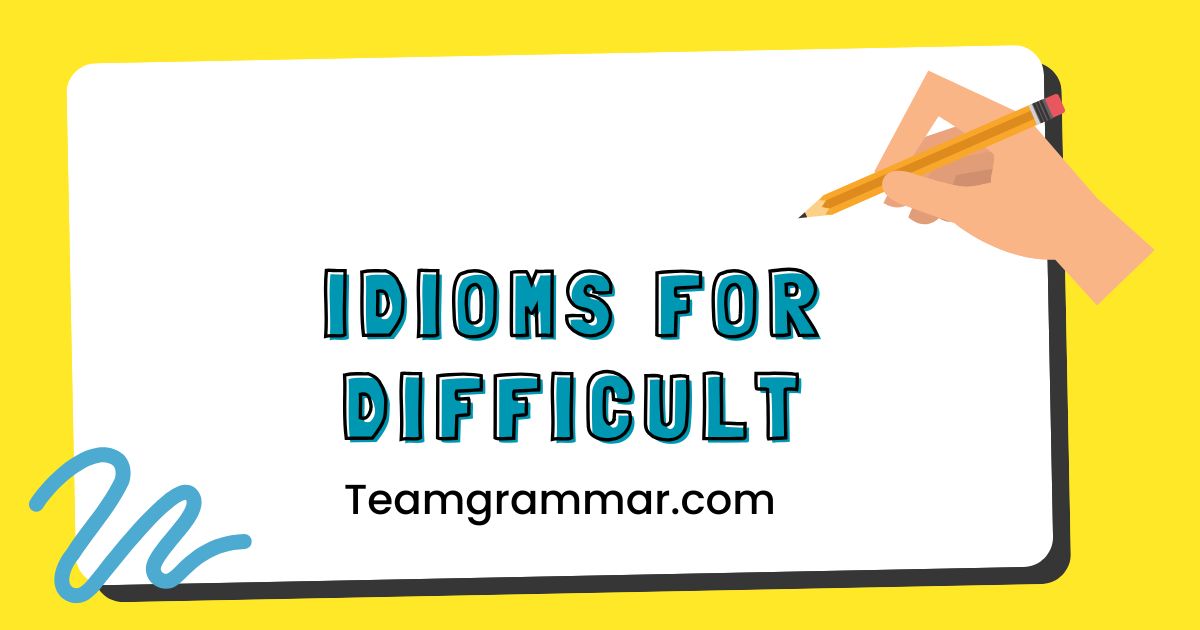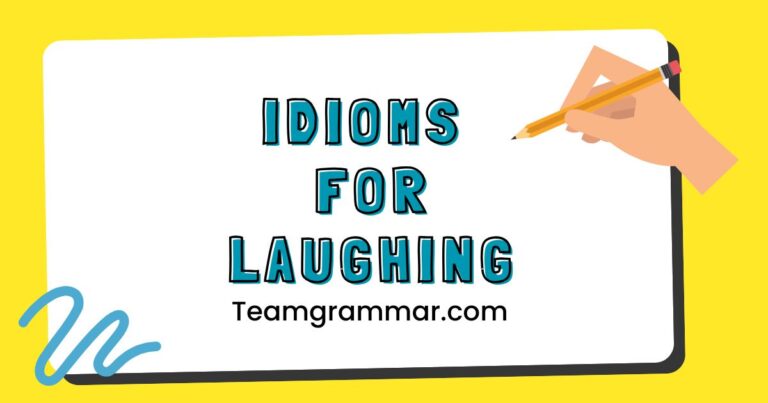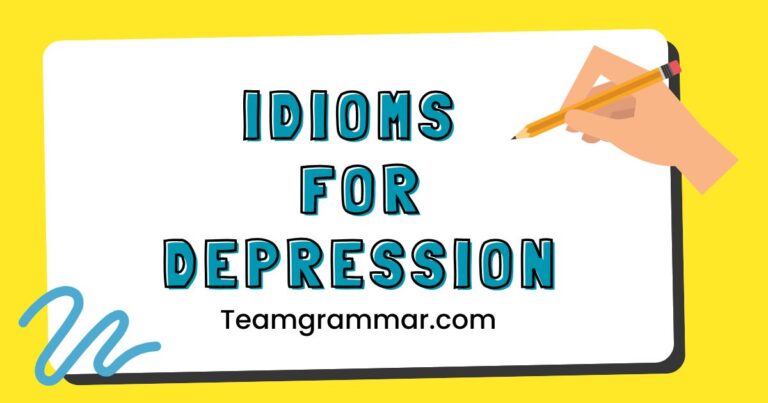34 Idioms for Difficult: Mastering Challenging English Expressions
Idioms add color and depth to the English language, but they can be particularly tricky when describing challenging situations. Understanding idioms that convey difficulty is crucial for both comprehension and effective communication.
This article explores a wide range of idioms related to difficulty, providing definitions, examples, and practical exercises to help you master these expressions. Whether you’re an English language learner or a native speaker aiming to refine your vocabulary, this guide will equip you with the tools to confidently navigate the nuances of idiomatic English.
This comprehensive guide is designed for English language learners of all levels, as well as native speakers looking to enrich their vocabulary. By exploring a variety of idioms, their meanings, and practical usage, you’ll gain a deeper understanding of the English language and improve your ability to express yourself with greater precision and flair.
Dive in and discover the colorful world of idioms for difficulty!
Table of Contents
- Introduction
- Definition of Idioms for Difficult
- Structural Breakdown
- Types and Categories of Idioms for Difficult
- Examples of Idioms for Difficult
- Usage Rules for Idioms for Difficult
- Common Mistakes with Idioms for Difficult
- Practice Exercises
- Advanced Topics
- Frequently Asked Questions
- Conclusion
Definition of Idioms for Difficult
An idiom is a phrase or expression whose meaning cannot be understood from the ordinary meanings of the individual words. It’s a figure of speech that relies on a shared cultural understanding.
Idioms related to “difficult” are phrases that describe situations, tasks, or people that present significant challenges, obstacles, or require considerable effort. They often convey a sense of struggle, complexity, or frustration.
These idioms function as descriptive tools, adding color and nuance to our language. They allow us to express the degree of difficulty in a more engaging and relatable way than simply stating “it’s difficult.” For example, saying something is “an uphill battle” conveys a sense of continuous struggle and effort, which is much more evocative than simply saying “it’s a difficult task.” The classification of these idioms falls under figurative language, specifically idioms of difficulty or adversity.
The context in which these idioms are used is broad, ranging from everyday conversations to formal writing, although some idioms are more appropriate for informal settings.
Structural Breakdown
The structure of idioms for difficulty varies widely. Some are simple phrases consisting of a few words, while others are more complex sentences.
Many idioms involve metaphorical language, using imagery to represent the concept of difficulty. For example, “a hard nut to crack” uses the image of a tough nut to symbolize a challenging problem or person.
Understanding the underlying structure can sometimes help in deciphering the meaning, but often the meaning is purely conventional and must be learned through exposure and practice. Some idioms follow common grammatical patterns, while others are more unique.
It’s important to note that the individual words in an idiom cannot be interpreted literally to understand the overall meaning. The phrase must be understood as a single, cohesive unit.
Types and Categories of Idioms for Difficult
Idioms that describe difficulty can be categorized based on the specific aspect of difficulty they emphasize. Here are some common categories:
Idioms Describing General Challenges
These idioms refer to situations that are generally difficult or problematic, without specifying the nature of the difficulty. They are versatile and can be used in a variety of contexts.
Idioms Describing Complexity
These idioms highlight the intricate and complicated nature of a task, problem, or situation. They often suggest that understanding or solving the issue requires significant analytical skills.
Idioms Describing Obstacles
These idioms focus on the barriers or impediments that make something difficult to achieve. They emphasize the presence of challenges that must be overcome.
Idioms Describing Struggle
These idioms convey a sense of ongoing effort and resistance. They emphasize the active engagement and persistence required to deal with a difficult situation.
Idioms Describing Significant Effort
These idioms emphasize the amount of work or energy required to accomplish something. They highlight the laboriousness of a task and the dedication needed to succeed.
Examples of Idioms for Difficult
The following sections provide extensive examples of idioms for difficult, categorized by the types discussed above. Each example is accompanied by a definition and a sentence illustrating its use.
Examples for General Challenges
This section provides examples of idioms that describe general challenges. These idioms are versatile and can be used in various situations to express that something is difficult.
The following table includes 20 examples of idioms that describe general challenges, along with their definitions and example sentences.
| Idiom | Definition | Example Sentence |
|---|---|---|
| A tough row to hoe | A difficult task or situation to deal with. | Starting a new business during a recession is a tough row to hoe. |
| No picnic | Not easy or pleasant. | Raising three children on a single income is no picnic. |
| An uphill battle | A difficult struggle against opposition. | Trying to change company policy proved to be an uphill battle. |
| Hard cheese | Tough luck. | Hard cheese if you missed the deadline, you won’t get credit. |
| A tall order | A difficult request or task. | Asking him to finish the project by tomorrow is a tall order. |
| Not a bed of roses | Not easy or comfortable. | Life as a refugee is certainly not a bed of roses. |
| A hard nut to crack | A difficult problem or person to understand. | This math problem is a hard nut to crack. |
| A thorny issue | A difficult or sensitive subject to deal with. | The issue of immigration is a thorny issue for many countries. |
| A headache | A difficult or annoying problem. | Dealing with customer complaints can be a real headache. |
| A pain in the neck | Someone or something that is annoying or troublesome. | My noisy neighbor is a pain in the neck. |
| Like pulling teeth | Very difficult to get someone to do something. | Getting him to talk about his feelings is like pulling teeth. |
| More trouble than it’s worth | The problems outweigh the benefits. | Fixing the old car would be more trouble than it’s worth. |
| A challenge | A difficult task or problem. | Learning a new language is always a challenge. |
| Against the grain | Difficult or contrary to one’s natural inclinations. | It went against the grain to fire such a loyal employee. |
| A hard pill to swallow | A difficult fact to accept. | Losing the game was a hard pill to swallow. |
| Tough going | Difficult progress. | The hike was tough going because of the steep terrain. |
| Heavy lifting | The most difficult part of a task. | He did the heavy lifting on this project, ensuring its success. |
| An ordeal | A very difficult or painful experience. | The surgery and recovery were a terrible ordeal. |
| No walk in the park | Not easy. | Running a marathon is no walk in the park. |
| A Herculean task | A task requiring immense strength or effort. | Cleaning up after the flood was a Herculean task. |
Examples for Complexity
This section focuses on idioms that describe complexity. These expressions emphasize the complicated and intricate nature of a task or situation.
The following table provides 20 examples of idioms that describe complexity, along with their definitions and example sentences.
| Idiom | Definition | Example Sentence |
|---|---|---|
| A Gordian knot | A complex problem that can only be solved by bold action. | The company’s financial problems were a Gordian knot that needed immediate attention. |
| A can of worms | A situation that is more complicated than it appears. | Opening up the investigation revealed a can of worms. |
| Double Dutch | Something incomprehensible. | The legal jargon in the contract was double Dutch to me. |
| Clear as mud | Not clear at all; confusing. | The instructions were as clear as mud. |
| A maze | A complex and confusing network of paths or passages. | Navigating the bureaucracy was like trying to find my way through a maze. |
| Wrap your head around | To understand something complicated. | I couldn’t wrap my head around the new software. |
| Lost in the weeds | To be overwhelmed by details and lose sight of the main point. | The team got lost in the weeds and missed the deadline. |
| It’s all Greek to me | Incomprehensible. | The physics lecture was all Greek to me. |
| Byzantine | Extremely complicated or devious. | The company’s organizational structure was Byzantine. |
| Convoluted | Extremely complex and difficult to follow. | The plot of the movie was convoluted and hard to understand. |
| A tangled web | A complicated and confusing situation. | His lies created a tangled web that he couldn’t escape. |
| Deep water | A difficult or dangerous situation. | The company was in deep water after the scandal broke. |
| Like a minefield | A situation filled with hidden dangers or difficulties. | Discussing politics with my family is like walking through a minefield. |
| A riddle wrapped in a mystery inside an enigma | Something completely baffling. | The politician’s motivations are a riddle wrapped in a mystery inside an enigma. |
| A complex equation | A situation with many interacting factors. | Balancing work and family life is a complex equation. |
| Intricate | Very complicated or detailed. | The watch had an intricate design. |
| Daunting | Intimidating or difficult to deal with. | The prospect of public speaking was daunting. |
| Mind-bending | Extremely complex or difficult to understand. | The philosophical concepts were mind-bending. |
| Over one’s head | Beyond one’s understanding. | The technical details of the project were over my head. |
| Esoteric | Understood by only a small number of people with specialized knowledge. | The professor’s lectures were filled with esoteric references. |
Examples for Obstacles
This section provides idioms that describe obstacles. These expressions emphasize the presence of barriers that make something difficult to achieve.
The following table includes 20 examples of idioms that describe obstacles, along with their definitions and example sentences.
| Idiom | Definition | Example Sentence |
|---|---|---|
| A stumbling block | An obstacle to progress. | Lack of funding was a major stumbling block for the project. |
| A roadblock | An obstacle that prevents progress. | The new regulations created a roadblock for small businesses. |
| A hurdle | A problem or difficulty that must be overcome. | The language barrier was a significant hurdle for the immigrants. |
| A barrier | Something that prevents progress or movement. | Prejudice is a major barrier to equality. |
| In the way | Obstructing progress. | His negative attitude was getting in the way of the team’s success. |
| An impediment | A hindrance or obstruction. | Lack of experience was an impediment to his career advancement. |
| A snag | An unexpected or hidden obstacle. | We hit a snag when we discovered the building permit was expired. |
| A pitfall | A hidden or unsuspected danger or difficulty. | The contract was full of pitfalls. |
| A bottleneck | A point of congestion or obstruction. | The lack of staff created a bottleneck in the production process. |
| A mountain to climb | A very difficult challenge. | Rehabilitating after the accident will be a mountain to climb. |
| An obstruction | Something that blocks progress or movement. | The fallen tree was an obstruction on the road. |
| A dead end | A situation that leads to nowhere. | The investigation reached a dead end. |
| A catch-22 | A paradoxical situation from which an individual cannot escape because of contradictory rules. | He couldn’t get a job without experience, but he couldn’t get experience without a job – it was a catch-22. |
| A vicious cycle | A situation in which an action intensifies the problem it is meant to solve. | Poverty and lack of education create a vicious cycle. |
| Between a rock and a hard place | Faced with two equally difficult choices. | I was between a rock and a hard place when my boss asked me to lie. |
| Walking on eggshells | Being very careful not to offend someone or cause problems. | I feel like I’m walking on eggshells around my boss. |
| In a bind | In a difficult situation. | I’m in a bind because I need the money, but I don’t want to work overtime. |
| Up against it | Facing difficulties. | We were up against it trying to meet the deadline. |
| Against the odds | Despite having little chance of success. | He won the race against the odds. |
| Swimming against the tide | Going against the majority or prevailing opinion. | She was swimming against the tide when she argued for the unpopular policy. |
Examples for Struggle
This section provides idioms that describe struggle. These expressions convey a sense of ongoing effort and resistance.
The following table includes 20 examples of idioms that describe struggle, along with their definitions and example sentences.
| Idiom | Definition | Example Sentence |
|---|---|---|
| Grinding away | Working hard and persistently. | He’s been grinding away at his studies all semester. |
| Toiling away | Working extremely hard. | The farmers were toiling away in the fields. |
| Sweating blood | Working extremely hard and worrying a lot. | I was sweating blood trying to finish the report on time. |
| Burning the candle at both ends | Working very hard and late into the night. | She’s been burning the candle at both ends trying to get the business off the ground. |
| Slogging away | Working hard and steadily, often at a boring or unpleasant task. | He was slogging away at his desk all day. |
| Keeping your head above water | Just managing to survive or stay afloat in a difficult situation. | With all the bills, we’re just trying to keep our heads above water. |
| Struggling to make ends meet | Having difficulty paying for basic necessities. | Many families are struggling to make ends meet during the recession. |
| Fighting an uphill battle | Facing a difficult struggle against opposition. | The environmental activists are fighting an uphill battle against the developers. |
| Against all odds | Despite having very little chance of success. | He succeeded against all odds. |
| Clawing your way to the top | Achieving success through great effort and determination. | She clawed her way to the top of the company. |
| On the ropes | Close to defeat or failure. | The boxer had his opponent on the ropes. |
| Hanging on by a thread | In a very precarious situation. | The company was hanging on by a thread after the financial crisis. |
| Biting off more than you can chew | Taking on more than you can handle. | He bit off more than he could chew when he volunteered for three projects. |
| Up to your ears | Very busy or deeply involved in something. | I’m up to my ears in work. |
| Running around like a headless chicken | Acting in a panicked and disorganized way. | Everyone was running around like a headless chicken after the fire alarm went off. |
| In the trenches | Involved in the difficult, day-to-day work of something. | The nurses are in the trenches, dealing with the pandemic firsthand. |
| Roughing it | Living without comfort or luxury. | We were roughing it on our camping trip. |
| Battling it out | Competing or struggling fiercely. | The two teams were battling it out for the championship. |
| Locking horns | Engaging in a conflict or argument. | The two politicians locked horns over the new policy. |
| Going through the mill | Undergoing a difficult or unpleasant experience. | He’s been going through the mill since his divorce. |
Examples for Significant Effort
This section provides idioms that describe significant effort. These expressions emphasize the amount of work and energy required to accomplish something.
The following table includes 20 examples of idioms that describe significant effort, along with their definitions and example sentences.
| Idiom | Definition | Example Sentence |
|---|---|---|
| Moving heaven and earth | Doing everything possible to achieve something. | She moved heaven and earth to get her child into the best school. |
| Going the extra mile | Doing more than is expected. | He always goes the extra mile for his customers. |
| Putting your back into it | Working very hard. | They were putting their backs into it to finish the project on time. |
| Giving it your all | Putting in maximum effort. | He gave it his all during the competition. |
| Breaking your back | Working extremely hard. | The construction workers were breaking their backs to build the bridge. |
| Putting in the hours | Spending a lot of time working. | He’s been putting in the hours to get promoted. |
| Pulling out all the stops | Doing everything possible to succeed. | The team pulled out all the stops to win the game. |
| Leaving no stone unturned | Searching thoroughly. | The detectives left no stone unturned in their investigation. |
| Going to great lengths | Making a great effort. | She went to great lengths to help her friend. |
| Burning the midnight oil | Working late into the night. | The students were burning the midnight oil preparing for the exam. |
| Going above and beyond | Doing more than is required. | The volunteers went above and beyond to help the community. |
| Sweating buckets | Working very hard and sweating a lot. | They were sweating buckets trying to move the heavy furniture. |
| Earning your keep | Working hard enough to justify your salary or position. | He’s been earning his keep since he joined the company. |
| Going the whole nine yards | Doing everything possible. | They went the whole nine yards to make the party a success. |
| Putting your shoulder to the wheel | Working hard and diligently. | Everyone needs to put their shoulder to the wheel to finish the project. |
| Digging deep | Making a great effort, especially when tired or discouraged. | The athlete had to dig deep to win the race. |
| Giving 110 percent | Giving more than your best effort. | The team gave 110 percent during the championship game. |
| Busting a gut | Making a great effort; working very hard. | They were busting a gut to get the job done on time. |
| Straining every nerve | Making a great effort; doing one’s utmost. | She strained every nerve to win the competition. |
| Pulling your weight | Doing your fair share of the work. | Everyone needs to pull their weight on this project. |
Usage Rules for Idioms for Difficult
Using idioms correctly requires understanding their specific meanings and contexts. Here are some general rules to follow:
- Context is Key: Idioms are highly context-dependent. Make sure the idiom fits the situation you’re describing.
- Audience Awareness: Consider your audience. Some idioms are more appropriate for informal settings, while others are suitable for formal communication.
- Word Order: Idioms have fixed word orders. Changing the order can alter the meaning or make the phrase nonsensical.
- Grammatical Consistency: Maintain grammatical consistency. For example, if an idiom uses a verb, ensure it agrees with the subject.
- Overuse: Avoid overusing idioms. While they add color to your language, too many can make your writing or speech sound unnatural.
One of the key points to using idioms correctly is ensuring that the tense and grammatical structure of the idiom aligns with the rest of your sentence. For example, if you’re talking about something that happened in the past, you need to make sure the verb in the idiom is also in the past tense.
Using the correct form of the idiom will ensure that your sentences are clear and grammatically sound.
Common Mistakes with Idioms for Difficult
Here are some common mistakes to avoid when using idioms for difficulty:
| Incorrect | Correct | Explanation |
|---|---|---|
| “It’s a walk in the park.” (when it’s difficult) | “It’s no walk in the park.” | The correct idiom is “no walk in the park,” meaning it’s not easy. |
| “He is pulling my leg.” (when causing difficulty) | (Use a different idiom depending on context) | “Pulling someone’s leg” means to joke or tease, not to cause difficulty. Use idioms like “a pain in the neck” or “a tough row to hoe” instead. |
| “She is biting more than she can eat.” | “She is biting off more than she can chew.” | The correct idiom is “biting off more than you can chew.” |
| “We are in deep water’s.” | “We are in deep water.” | The idiom “in deep water” does not require a possessive. |
| “It’s clear as day.” (when it’s confusing) | “It’s as clear as mud.” | “Clear as day” means easy to understand; the opposite is “clear as mud.” |
Another common mistake is misunderstanding the literal meaning of the words in the idiom and trying to interpret the idiom based on that. Remember that idioms have a figurative meaning that is different from the literal meaning of the individual words.
It is crucial to learn the established meaning of each idiom to avoid misusing it.
Practice Exercises
Test your understanding of idioms for difficulty with these exercises.
Exercise 1: Multiple Choice
Choose the correct idiom to complete each sentence.
| Question | Options | Answer |
|---|---|---|
| 1. Starting a new business during a recession is ______. | (a) a piece of cake (b) a tough row to hoe (c) a walk in the park | (b) |
| 2. Dealing with customer complaints can be a real ______. | (a) joy (b) headache (c) breeze | (b) |
| 3. Getting him to talk about his feelings is like ______. | (a) a walk in the park (b) pulling teeth (c) smooth sailing | (b) |
| 4. The company was ______ after the scandal broke. | (a) in deep water (b) on top of the world (c) smooth sailing | (a) |
| 5. The investigation reached ______. | (a) a breakthrough (b) a dead end (c) a green light | (b) |
| 6. He ______ when he volunteered for three projects. | (a) hit the nail on the head (b) bit off more than he could chew (c) found his calling | (b) |
| 7. She ______ to get her child into the best school. | (a) moved heaven and earth (b) rested on her laurels (c) let sleeping dogs lie | (a) |
| 8. He always ______ for his customers. | (a) goes the extra mile (b) calls it a day (c) cuts corners | (a) |
| 9. The instructions were ______. | (a) crystal clear (b) as clear as mud (c) plain as day | (b) |
| 10. The environmental activists are ______ against the developers. | (a) fighting an uphill battle (b) sitting pretty (c) having a field day | (a) |
Exercise 2: Fill in the Blanks
Fill in the blanks with the appropriate idiom for difficulty.
| Question | Answer |
|---|---|
| 1. Trying to change company policy proved to be __________. | an uphill battle |
| 2. Life as a refugee is certainly __________. | not a bed of roses |
| 3. The issue of immigration is __________ for many countries. | a thorny issue |
| 4. Fixing the old car would be __________. | more trouble than it’s worth |
| 5. He won the race __________. | against the odds |
| 6. The company was __________ after the scandal broke. | in deep water |
| 7. The lack of staff created __________ in the production process. | a bottleneck |
| 8. I feel like I’m __________ around my boss. | walking on eggshells |
| 9. She’s been __________ trying to get the business off the ground. | burning the candle at both ends |
| 10. The students were __________ preparing for the exam. | burning the midnight oil |
Exercise 3: Sentence Completion
Complete the following sentences using an appropriate idiom for difficulty.
| Question | Answer |
|---|---|
| 1. The project was so complex that it felt like trying to __________. | solve a Gordian knot. |
| 2. Because of the many unexpected problems, the task turned out to be __________. | a can of worms. |
| 3. The legal jargon in the contract was __________. | double Dutch to me. |
| 4. Navigating the bureaucracy was like trying to find my way through __________. | a maze. |
| 5. With all the new responsibilities, I’m just trying to __________. | keep my head above water. |
| 6. The company’s financial problems were so severe that they were __________. | hanging on by a thread. |
| 7. The negotiations between the two countries were so tense that they __________. | locked horns. |
| 8. The athlete had to __________ to win the championship. | dig deep. |
| 9. The detectives vowed to __________ in their search for the missing evidence. | leave no stone unturned. |
| 10. The task of cleaning up after the disaster was truly __________. | a Herculean task. |
Advanced Topics
For advanced learners, exploring the origins and etymology of idioms can provide a deeper understanding of their meaning and cultural significance. Researching the historical context behind
the phrases can reveal fascinating insights into how language evolves and reflects societal values.
Additionally, analyzing the use of idioms in literature and media can enhance your ability to interpret complex texts and appreciate the artistry of language.
Another advanced topic is the study of how idioms vary across different dialects and regions. English idioms, in particular, can differ significantly between countries like the United States, the United Kingdom, and Australia.
Understanding these regional variations is essential for effective communication in a global context. Furthermore, consider exploring the use of idioms in specialized fields, such as business, law, or medicine, where specific phrases may carry unique meanings and implications.
Frequently Asked Questions
Conclusion
Mastering idioms for difficult is an ongoing process that requires dedication and practice. By understanding the definitions, structures, and usage rules of these expressions, you can significantly enhance your English language skills and communicate with greater precision and flair.
Remember to pay attention to context, be aware of your audience, and avoid common mistakes. With consistent effort, you’ll be able to confidently navigate the nuances of idiomatic English and express yourself effectively in a wide range of situations.
Continue to explore and expand your knowledge of idioms, and don’t be afraid to experiment with using them in your own speaking and writing. The more you practice, the more natural and confident you’ll become in your use of idiomatic language.
Embrace the challenge, and enjoy the journey of mastering these colorful and expressive phrases.







